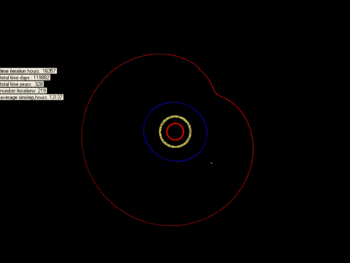(119979) 2002 WC19
| Discovery | |
|---|---|
| Discovered by | Palomar Observatory |
| Discovery date | November 16, 2002 |
| Designations | |
| MPC designation | (119979) 2002 WC19 |
| Twotino[1][2] | |
| Orbital characteristics[3] | |
| Epoch JD 2457000.5 (9 December 2014) | |
| Aphelion | 60.94 AU |
| Perihelion | 35.361 AU |
| 48.151 AU | |
| Eccentricity | 0.26564 |
| 334.13 yr (122,042 d) | |
| 315.34° | |
| Inclination | 9.1685° |
| 109.7742° | |
| 43.75° | |
| Known satellites | 1 (≈127 km)[4] |
| Physical characteristics | |
| Dimensions | ≈440 km (assumed)[4] |
| Albedo | 0.07 (expected from theory)[5] |
| 4.9 (combined system) | |
|
| |
(119979) 2002 WC19, also written as (119979) 2002 WC19, is a twotino, i.e. it is in a 1:2 orbital resonance with Neptune. It was discovered on November 16, 2002 at the Palomar Observatory. It is probably a dwarf planet.[5]
Knowing how many twotinos there are may reveal whether Neptune took roughly 1 million or 10 million years to migrate about 7 AU from its birth location.[6]
 |
 Neptune is held stationary at 5 o'clock. |
Satellite
A natural satellite was reported to be orbiting (119979) 2002 WC19 on February 27, 2007. It is estimated to be 2,760 ± 250 km from the primary and to be around 139 kilometres (86 mi) in diameter.[4]
References
- ↑ Marc W. Buie (2004-12-14). "Orbit Fit and Astrometric record for 119979". (using 61 of 65 observations) SwRI (Space Science Department). Retrieved 2009-03-04.
- ↑ "MPEC 2009-C70 :Distant Minor Planets (2009 February 28.0 TT)". Minor Planet Center. 2009-02-10. Retrieved 2009-03-04.
- ↑ "JPL Small-Body Database Browser: 119979 (2002 WC19)" (2012-11-06 last obs; arc: 10.89 years). Retrieved 2014-11-15.
- ↑ 4.0 4.1 4.2 Wm. Robert Johnston (20 September 2014). "(119979) 2002 WC19". Johnston's Archive. Retrieved 2014-11-15.
- ↑ 5.0 5.1 Mike Brown, How many dwarf planets are there in the outer solar system?
- ↑ Ron Cowen (2009-01-04). "On the Fringe". ScienceNews. Archived from the original on 7 January 2010. Retrieved 2010-01-04.
External links
- Orbital simulation from JPL (Java)
- Ephemeris
| ||||||
| ||||||||||||||||||||||||||||
| ||||||||||||||